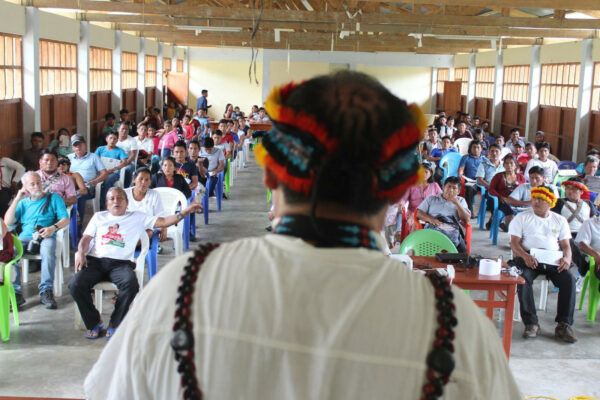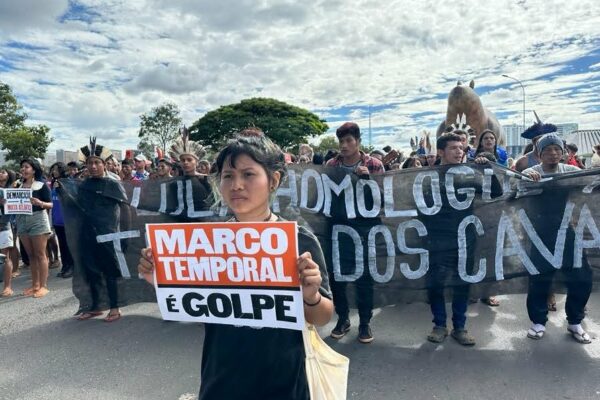
One year ago, on May 19th 2010, the Peruvian Congress passed a ground-breaking new consultation law that would bring Peru in line with their obligations under international law to involve indigenous peoples in decisions that would affect their lands, their future, and their way of life. Two days later President Alan Garcia vetoed the law in a move heavily criticised by the UN special representative for indigenous rights, James Anaya, and the International Labor Organization. One year later no further progress has been made and the government is pushing a new Forestry Law and Environmental Services Law without a consultation law. Indigenous peoples are now largely resigned to waiting for the new government to see if they will finally be listened to and have their rights respected.
The consultation law approved by Congress on May 19th, 2010 was the product of one year of dialog and consensus building between indigenous peoples, government, Congress and the Ombudsman Office following the violent clashes in Bagua in June 2009. The Peru Ombudsman office has repeatedly expressed concern at the failure to approve the law and the inactivity in congress. The Ombudsman calls attention to the 233 active social conflicts in Peru, in large part the product of a failure to involve local communities and indigenous peoples in decisions that affect their land and resources. The Ombudsman has consistently highlighted the political importance of the trust built between the State and indigenous organizations with the passing of the consultation law; consequently, the government’s failure to implement the law threatens to undermine the hard-earned consensus that has been achieved between the groups.
Despite the efforts of the Ombudsman Office, the inactivity of Congress and the courts on these issues raises serious questions about the government’s commitment to indigenous rights. On top of that the government has been pushing a new forestry law – an earlier version of the law was amongst the causes of the protests across the country in 2009 – with a superficial consultation process that, without a legislative framework, lacks good faith and transparency and has been called into question by indigenous organizations across the country. The process accompanying the forestry law and the recent regulatory framework for consultation from the Ministry of Energy and Mines are seen as further imposition by the State, disregarding previous efforts in consensus building and Peru’s commitments under Convention 169 of the International Labor Organization (ILO).
A law that creates a framework for consulting indigenous peoples is both an obligation of the state and a right of indigenous peoples. A consultation process that respects indigenous rights would not only bring Peru in line with its obligations under international treaties and human rights declarations, it would also fulfill the State’s obligations to defend and protect the rights, life, and culture of indigenous peoples. For indigenous peoples whose resources and future are threatened by extractive projects such as oil drilling, consultation and the right to withhold consent means exercising their right to decide their own future, not just as individuals but as distinct peoples with their own unique culture and relationship with their land and resources.
With the proposed consultation law Peru has an opportunity to lead the continent in the respect of indigenous rights and implementation of ILO Convention 169. Other countries in Latin America have implemented consultation in their legislation to varying degrees. In Columbia the Supreme Court has recently made several important decisions upholding indigenous peoples’ right to be consulted, such as the suspension of the activities of Muriel Mining for failing to adequately consult the people affected by their activities. The Guatamalan government passed a consultation law this year, but the UN special representative James Anaya has criticised the law as “having serious limitations and failings with respect to essential obligations of the state to consult with indigenous peoples”. Chile only recently signed ILO 169, but the day it became law the government also passed decree 124 which indigenous organizations denounce as undermining their right to consultation.
Consultation with indigenous peoples and their participation in decisions that affect their future is urgently needed as part of a solution to the many social conflicts faced by Peru. Peru assumed the obligation to consult indigenous peoples when it signed Convention 169 of the International Labor Organization in 1993 and the UN Declaration of the Rights of Indigenous Peoples. Not only that, it is also the obligation of a democratic government that respects people’s dignity. Consultation is a manifestation of the right of indigenous peoples to participate in decisions about their lives and their future, as indigenous peoples and as Peruvian citizens.
The upcoming elections on June 5th also mark the two year anniversary of the violent clashes in Bagua that left 34 indigenous protesters and police dead. The protests were in large part due to the failure of the government to consult indigenous peoples while pushing the expansion of extractive projects in the Amazon Rainforest. The consultation law passed by congress one year ago was the result of a year of consensus and trust building with indigenous peoples. The government now needs to respect the agreements that have been built and strengthen the relationship with indigenous peoples by approving the law.
Angela Tapia is an indigenous rights expert from Puno, Peru who is currently studying a Masters in Latin American studies at the University of Texas. Angela is currently volunteering at Amazon Watch as part of her internship.














